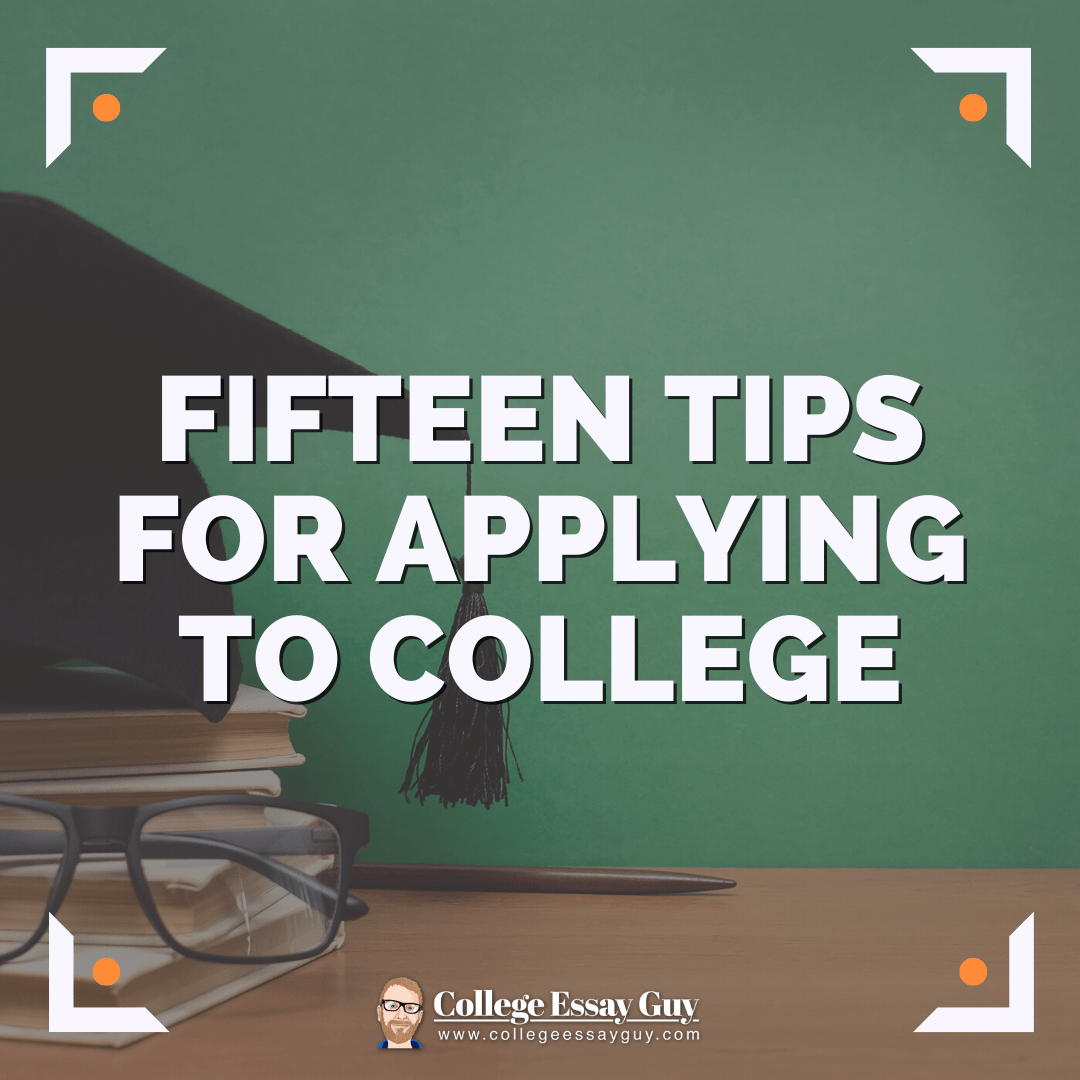Explora los resultados de búsqueda web relacionados con este dominio.
Applying to college can be stressful. Here are nine tips to help increase your admissions odds and create a standout application.
High SAT/ACT scores can impress admissions committees, even at test-optional schools. Students can demonstrate their interest by applying early decision and visiting the campus. The college application process is unlike any other. It requires hard work, determination, and often the help of family, school staff, or college advisors.Even if a college you’re applying to doesn’t require SAT/ACT scores, it’s usually best to submit them. A Dartmouth University study found that test scores helped to identify “high-achieving less-advantaged applicants.” Without scores, admissions officers relied more on factors that favor higher-income students, such as guidance counselor recommendations and nonacademic ratings by admissions officers.Although test scores are a helpful part of a college application, colleges in the NACAC report didn’t weigh them as heavily as factors like grades and course rigor. Approximately 70% of colleges consider standardized test scores of either “limited” or “no” importance. The personal statement plays a critical role in college admissions, even as standardized test requirements are being reinstated.The 2023 NACAC study found that just over 40% of colleges considered students’ demonstrated interest in attending as at least moderate importance in the admissions process. If you genuinely want to attend a specific university and want to demonstrate that on your application, consider visiting the campus, going on a campus tour, participating in optional interviews, and directly contacting admissions representatives.


The senior year of high school is filled with deadlines and decisions for college-bound students. Colleges and universities set their own deadlines to apply for admission, so it’s important to thoroughly research schools to learn more about their deadlines and application processes. Many schools
If you’re curious about upcoming college application deadlines, read our guide for an overview of the deadlines and types of admission for popular schools.You also have the option to apply during the regular admission period, and some schools offer rolling admission, which provides a more flexible application timeframe. Each application type has its advantages and disadvantages, so it’s essential to understand them before starting the application process. This article explores the different types of college application deadlines and provides an overview of the deadlines and types of admission for several popular colleges and universities.While many colleges and universities offer different deadlines for applying, they don’t all offer the same ones. Below, we outline common options for college application deadlines, along with brief explanations, to help you decide which option is best for you. Early action is when you apply to schools before the regular admission deadline but leave your options open.This shows that you are committed to the school and aren’t applying to others. If your application is not accepted, you may then apply to other schools. Regular admission means that you apply no later than the regular admission deadlines for colleges and universities.
Would you thrive, or merely survive? Your application contains a lot of information that a college can use to evaluate your academic experiences and strengths. ... So, how do colleges use this information to weigh the factors that are important to them in admissions decisions?
Every few years, the National Association for College Admissions Counseling surveys colleges creates a report called the State of College Admissions (SOCA), in which they survey colleges about the factors that they weigh in the admissions process, assigning each factor “considerable importance,” “moderate importance,” “limited importance,” or “no importance” in the application process.Many colleges use early decision to strategically shape their incoming classes, and admit larger percentages of students than they do in the regular admission round. Sound intriguing? Do you like details and statistics and wish that someone compiled a list that illuminates much about this process for many schools all in one place? Then do we have the list for you. · Colleges want to know if their applicants really love them, and many use tons-o-data (that’s a technical term) to track how engaged you are with them as you navigate the application process.To go deep into this topic, read this blog post to learn far more than you probably ever wanted to know about demonstrated interest and why a research paper declared this admissions factor to be “Another Edge for the Wealthy.” · Yes, it is absolutely true that the college application process can be very very confusing.Her expertise encompasses all aspects of the college search and application process, from helping students to choose the right courses and extracurricular activities to building college lists and writing powerful and meaningful essays. Hillary specializes in both US college admissions and global university admissions.

Although schools have different requirements, here are the main steps of the college application process: Create a list of colleges you're interested in. Research and visit schools to narrow down the list. Fill out the FAFSA®, and consider finances and scholarship opportunities.
Print a checklist to track your progress on each part of the application. Build a spreadsheet to stay on top of submission deadlines. Gather the Necessary Documents. · Your Social Security number. Your high school code. A copy of your high school transcript. Your score report from a college admission test.Knowledge is power. Knowing what to expect from the application process makes a difference. Research the schools you're interested in applying to. Learn as much as you can about their admissions process. ... Keep in mind that signing up for college is a multistep process.Although schools have different requirements, here are the main steps of the college application process: Create a list of colleges you're interested in. Research and visit schools to narrow down the list. Fill out the FAFSA®, and consider finances and scholarship opportunities. Get letters of recommendations, if required. Take college admission tests.Application and school portal login credentials. ... College admissions officers consider many factors when reviewing applications.

Learn how to shine during the application process and get ready for the arrival of your admissions decision letters. Learn how the college admissions process may be different for home-schooled or cyber school students, student athletes, student with disabilities, and nontraditional students.

With admission to some colleges becoming increasingly competitive, applicants may want to take the extra effort to catch the eye of admissions officers. Here are seven tips to make your application shine.
Displaying confidence and a passion of yours are both good ways to convey enthusiasm to a college admissions officer. Be passionate about the school and show it. Exhibit confidence and an attitude of gratitude. Convince the college that you're a good fit and can succeed there. In a stack of thousands of college applications that feature high GPAs and endless achievements, it can be difficult for a prospective student to stand out.But with authenticity and an understanding of what admissions officers seek, you can help your application rise to the top. “College admission counselors don’t seek to be impressed by students,” says Laura Stratton, director of admission at Scripps College in California.Applicants who can persuasively demonstrate their abilities and aspirations can project confidence to admissions officers. “The best quality a student can bring to the admission process is a sense of knowing themselves, their strengths, goals and what they will contribute to their college community,” Stratton says.Adds Budak: “The better an applicant can align their background and goals with the mission of the institution, the more likely they will be seen as a good fit.” · Related: What to Wear to a College Interview: Everything You Should Know · Admissions counselors read thousands of essays every year, but one way to really stand out is by expressing your passion authentically.
First and foremost, students should know that colleges and universities evaluate their applications in the context of their school and the opportunities available to them. This means that if students did not have AP classes available to them at their schools, admissions officers will not expect ...
First and foremost, students should know that colleges and universities evaluate their applications in the context of their school and the opportunities available to them. This means that if students did not have AP classes available to them at their schools, admissions officers will not expect to see AP courses or AP exam scores included in their applications.Finally, while students who do not have access to AP classes should consider their options and make a strategic decision about taking exams on the basis of their applicant profiles and academic goals, students who have taken AP courses absolutely should take AP exams. Failing to sit for the exams will not only foreclose the possibility of earning college credit, but it will also reflect poorly on your application and raise questions with admissions committees.AP courses are offered at thousands of high schools across the U.S.—approximately 35% of public high school graduates in the Class of 2023 took at least one AP exam.In order to determine whether the time and effort you will put into studying and taking an AP exam will be justified, you should research whether the schools you are considering applying to give college credit for high AP exam scores. You can often find this information on admissions or departmental websites, or by contacting admissions representatives at each respective school.
College admissions officers admit they’re attracted to applicants who’ve been recognized by their teachers or peers for their leadership qualities. So if your kid is a student council president or a team captain, that’s terrific.
Your child’s social media presence is fair game as part of their college application; schools don’t want bad apples disturbing their campus. Encourage your teenager to clean up what’s out there and be cautious about what they post from now on. A 2016 Time article reports “40 percent of admissions officers say they visit applicants social media pages to learn about them.” IvyWise writes that 35 percent of admissions counselors found something that “negatively impacted an applicant’s chances of getting in.” Have your teenager to Google themselves to see what’s out there, erase embarrassing tweets, and follow these social media tips to clean up their online presence.Contrary to what you may have heard, experts say community service is vastly overrated as an element of college applications. In an article called “Colleges Don’t Care About Community Service“, Ian Fisher, former admission advisor at Reed College, avows, “there is nothing extra special about community service.”Your teen has nothing to lose by applying, and much to gain — including practice writing essays, an important skill that will assist them in their writing classes, their SAT and ACT tests, and in their college application essays. Straight-A’s in “Mickey Mouse” courses, where an A is the norm, can be less persuasive than a B in an advanced class. A survey from the National Association for College Admission Counseling (NACAC) reveals that 60 percent of admissions officers factor in the applicant’s strength of curriculum.The risk associated with this reward, however, is that ED is binding, so if they’re accepted, students must attend that college. Early action, on the other hand, is non-binding, so students can still go elsewhere even if they’re admitted. EA applications typically provide less of an admissions advantage, but not always.


Learn how to stand out in college applications from admissions experts. Follow along for 15 tips on how to improve your college application.
Our admissions experts have reviewed this article to ensure it delivers accurate information and effective guidance. Learn more about our editorial standards and process. ... How to Stand Out in Your College Application: 15 Expert TipsFAQs: How to Stand Out in College ApplicationsLearn how to stand out in college applications as well as tips and advice from experts on how to make your college application unique here. ... Your college application is an excellent opportunity to show why a school should offer you acceptance. It takes a lot of research and polishing to ensure your application makes a good impact on the admissions committee.Your best chance at standing out is to show the admissions team that your credentials align with their expectations and make you a good fit for their institution. Schools want to see you holistically: your academic abilities, your experiences, your short and long term goals, and overall personality. Make sure your application is unique; it’s a sure-fire way to stand out amongst other applicants. Here are some tips on applying for college and on how to make your application shine to boost your chances of getting into college.One of our top college application tips is to focus on your personal statement. Imagine your life as a book and getting into college is your next chapter. All your life experiences, good or bad, have shaped you into the person you are now, and you can use them to write the personal statement on your college applications. College admissions committees want to know what makes you tick, how you evolved as a person in high school, and what you hope to achieve in the future.
Find things that excite you about ... in admissions, schools can be likely but usually not entirely safe; and second, the term “safety school” sometimes has a pejorative connotation—and to the above-quoted student’s point, any school you apply to should be one you’d be thrilled to attend.] According to college-bound seniors, it’s important to complete your applications carefully ...
Find things that excite you about your safety schools so that you are not disappointed if that's where you end up going.” [Editor’s note: We prefer to think of “safety” schools as “likely” schools for two reasons: First, since there are no guarantees in admissions, schools can be likely but usually not entirely safe; and second, the term “safety school” sometimes has a pejorative connotation—and to the above-quoted student’s point, any school you apply to should be one you’d be thrilled to attend.] According to college-bound seniors, it’s important to complete your applications carefully and thoughtfully.Check out our wide range of college counseling options, and schedule a free consultation with one of our college admissions experts. ... For more than 40 years, students and families have trusted The Princeton Review to help them get into their dream schools. We help students succeed in high school and beyond by giving them resources for better grades, better test scores, and stronger college applications.College-bound seniors also advised future applicants to trust that being yourself is part of the formula for success. Particularly in the wake of the college admissions scandal, this advice is heartening.Get advice from seniors who’ve just successfully completed the college process. Here are 8 tips of what to do—and avoid—when you apply to college.

Ivy Day 2024 is a pivotal moment to explore the evolving landscape of college admissions and anticipate future directions. Let's dive into the latest developments.
Ivy Day 2024, the day when top schools' admissions decisions are released, is a pivotal moment to explore the evolving landscape of college admissions and anticipate future directions. This year’s transformations are reshaping college application strategies in profound ways.In contrast, applications filed during the regular decision period increased by 26% over the same timeframe. This suggests a growing trend among high school seniors to leverage early application options as part of their strategy for college admissions, reflecting the competitive nature of securing admission to top institutions.From adapting to the reemergence of standardized testing requirements at esteemed institutions like Dartmouth, Brown, and MIT, to addressing the challenges posed by the digitalization of the SAT and the nuanced evaluation of college essays at Duke, it's clear that flexibility and strategic planning are paramount. Furthermore, the rise in early application submissions highlights the importance of proactivity and informed decision-making in securing a favorable college admission outcome.Dec 12, 2024,01:40pm ESTHow To Make 2025 A Successful College Admissions Year For Your Kids · Dec 3, 2024,12:11pm ESTSet Your Middle School Student On The Path To College Success · Nov 26, 2024,10:26am ESTTurn College Application Stress Into Family Bonding This Holiday Season

How to Choose a Topic for an Essay?How to Structure a College Admissions Essay13 Tips to Write a College Admission EssayExamples of College Essays for Ivy League SchoolsCollege Admission Essay Creation FAQs ... Learning how to write a college essay is crucial for the application process.
Unfortunately, there is no one-size-fits-all template that you can follow when writing your college admission essay. You are allowed, however, to use basic structures when writing your essay that can work for any prompt. You should also pay attention to any college application essay formatting guidelines your school provides. Here are 13 tips for writing college essays to help you get admitted!This can significantly increase your chances of admission, especially when competing with applicants of similar credentials. Your college essays should illustrate your personality, commitment to learning, and eagerness to contribute to the college community.The Common Application, and a few schools, will give you a list of prompts to help you tell your story. These prompts are useful starting points and invite students to think about challenges they’ve overcome or experiences that have made them grateful. It’s an opportunity to display your growth, strength, and what makes a candidate who they are. Remember that your college admissions essay isn’t any ordinary paper, it’s a story.Remember, your essay must add insight to your application and reveal your thoughts, motivations, and who you are as a person. It is advised students should use the summer before their senior year to reflect on their experiences and determine what they would like to share with the admission committee. Ideally, you should complete the first draft of your essay by the start of school in September, which will allow you to focus on your senior year. A good college essay makes an impact on the reader.
A few days after you submit your application, contact the school’s admissions office to see if they have received your materials. Make sure they have your high school transcript, your SAT®/ACT® test scores, and letter(s) of recommendation. Pro tip #1: Save everything!
Create a spreadsheet and list each college you’re pursuing with their different application deadlines. Whether you plan on submitting your application early, or your school accepts them on a rolling admissions timeline, here are some options and types of deadlines you should become familiar with:Instead of specific deadlines, schools will go through applications until they’ve filled all the slots for their incoming class. Similar to early action and regular decision deadlines, rolling admission gives you the freedom to choose from the schools you’re accepted into. Remember that each college you’re considering will potentially receive thousands of applications.Ever heard the saying, “Check yourself before you wreck yourself?” I can’t think of anything more fitting when it comes to college admissions and your social media accounts. You want to make sure they portray the same person you are describing on your college application.Whether you’re applying to college directly through the school’s website, or through the Common App, your college application essay is still a key aspect of your overall application. Here are some ways you can take your essay to the next level: Instead of writing about a topic that you think a college admissions professional would want to read, write about something you’re passionate about.

Gather dates from all your college applications so that you can view everything from one document. College websites are the best place to find accurate deadline information. Be consistent. Using the same name on all your forms makes things easier for admissions officers.
To stay on track and get everything in on time, we recommend creating an application checklist. Submit once. When you apply online, you'll usually get an automated response saying the school received your materials. If you don't, contact the college's admissions office.It should list what you still need to submit and detailed instructions on what you can do to get it in. If the information is unclear, don't hesitate to call the admissions office for guidance. Monitor your email. When preparing for college application cycles, create a professional-sounding email account exclusively for college matters.It’s never OK to lie on a college application. The best college admission advice you can get is to remain honest. Lying can result in the complete revocation of your application.Submitting your application is the first step in your college journey. Learn how to fill out a college application while staying organized and prompt.

I am here to reassure college applicants, families, and educators that you can take your finger off the AI panic button.
Brennan Barnard writes about the nuances of college admission. ... As we launch into a new academic year, unsurprisingly, artificial intelligence is in the headlines and on many minds. I am here to reassure college applicants, families, and educators that you can take your finger off the AI panic button.Safe to say, the awareness is there and perhaps the evolution of AI will anchor a revolutionary solution. Not only can it address the increasingly transactional nature of admission from the college perspective, but AI can also level the playing field for applicants.Emily Pacheco is an assistant director of admission at Loyola University Chicago, a self-described “AI enthusiast,” and founder of NACAC’s special interest group for AI and Admission. She agrees with Khan, saying “AI has the potential to support colleges in assessing applications by offering new ways to analyze a broader set of data points, including essays, recommendation letters, and extracurricular activities, in addition to traditional metrics like grades and test scores.” She adds, “When implemented thoughtfully, AI can help highlight unique skills, experiences, and potential that might align with an institution’s values and mission.However, it’s important to recognize that AI’s impact on creating a more holistic admission process depends heavily on careful design, unbiased data, and its integration as a tool to complement, rather than replace, human judgment.” She explains that “AI is already revolutionizing the college admission process by enhancing the efficiency and fairness of how applications are evaluated.
Your best chance at standing out is to show the admissions team that your credentials align with their expectations and make you a good fit for their institution. Schools want to see you holistically: your academic abilities, your experiences, your short and long term goals, and overall personality.
Our admissions experts have reviewed this article to ensure it delivers accurate information and effective guidance. Learn more about our editorial standards and process. ... How to Stand Out in Your College Application: 15 Expert TipsFAQs: How to Stand Out in College ApplicationsLearn how to stand out in college applications as well as tips and advice from experts on how to make your college application unique here. ... Your college application is an excellent opportunity to show why a school should offer you acceptance. It takes a lot of research and polishing to ensure your application makes a good impact on the admissions committee.Your best chance at standing out is to show the admissions team that your credentials align with their expectations and make you a good fit for their institution. Schools want to see you holistically: your academic abilities, your experiences, your short and long term goals, and overall personality. Make sure your application is unique; it’s a sure-fire way to stand out amongst other applicants. Here are some tips on applying for college and on how to make your application shine to boost your chances of getting into college.One of our top college application tips is to focus on your personal statement. Imagine your life as a book and getting into college is your next chapter. All your life experiences, good or bad, have shaped you into the person you are now, and you can use them to write the personal statement on your college applications. College admissions committees want to know what makes you tick, how you evolved as a person in high school, and what you hope to achieve in the future.

First are early decision deadlines, usually in November. Students who apply via early decision, or ED, hear back from a college sooner than their peers who turn in applications later. ED admissions decisions often come out by December.
Schools with rolling admissions evaluate applications as they receive them and release admissions decisions on an ongoing basis. These schools may have a priority filing date, but they generally don't have a hard cutoff date for applications. The institutions continue accepting them until all spots in the incoming class are filled. Read: Focus on 7 Strategies to Get Into College.In the first portion of a college application, students have to provide basic information about themselves, their school and their family. Colleges also ask for an official high school transcript, which is a record of the courses students have taken and the grades they have earned. Admissions offices typically ask that a transcript be sent directly from the high school rather than from the student, says Geoff Heckman, school counselor and department chair at Platte County High School in Missouri.Test-blind means that scores will not be considered if submitted. By contrast, test-optional colleges do not require ACT or SAT scores but will consider them if submitted as part of an application. Chu notes that "admissions officers still want to see test scores if possible" and that high marks will only help.College applications give students the chance to provide information on the extracurricular activities they participated in while in high school. In this section, students should detail all of the ways they spend their time outside of class, Barron says. This includes structured activities like sports or clubs, as well as family obligations such as caring for siblings or part-time employment, she says. Some admissions officers spend significant time evaluating this section, Jones says, but he adds this is often the most overlooked part of the application.


Getting into a selective college has always been a source of anxiety and stress for students, but this year seemed like academic Hunger Games.
Then Covid swept through, forcing colleges to let students apply without standardized test scores — which, as the university consultant Ben Kennedy says, “tripled the number of kids who said to themselves, ‘Hey, I’ve got a shot at admission there.’” More applications, more market power for the schools and, for the students, an ever smaller chance of getting in.The quality of the applicants has risen also. In 2002, the nation produced 134 perfect ACT scores; in 2023 there were 2,542. Over the same period, the United States — and beyond it, the world — welcomed a great many more families into the ranks of the wealthy, who are by far the most likely to attend an elite college.Selective college admissions have been a vortex of anxiety and stress for what seems like forever, inducing panic in more top high school seniors each year. But the 2023-24 admissions season was not just an incremental increase in the frantic posturing and high-pressure guesswork that make this annual ritual seem like academic Hunger Games.The first cracks appeared around the rules that had long governed the process and kept it civilized, obligating colleges to operate on the same calendar and to give students time to consider all offers before committing. A legal challenge swept the rules away, freeing the most powerful schools to do pretty much whatever they wanted. One clear result was a drastic escalation in the formerly niche admissions practice known as early decision.

There are some exceptions where ... rolling admissions may be good last-minute options for students. But May 1 has traditionally been the decision deadline across higher education, even earning the name "College Decision Day," so students typically need to follow that timeline. If a student is applying for early decision or early action, there will be even earlier deadlines to submit application materials. ... A well-thought-out plan, anchored by a few organizational tips, can keep ...
There are some exceptions where applications are accepted later, and schools that offer rolling admissions may be good last-minute options for students. But May 1 has traditionally been the decision deadline across higher education, even earning the name "College Decision Day," so students typically need to follow that timeline. If a student is applying for early decision or early action, there will be even earlier deadlines to submit application materials. ... A well-thought-out plan, anchored by a few organizational tips, can keep students on track with college applications.Letters of recommendation from teachers, school counselors and other sources are important to providing college admissions officers deeper context and colorful details about applicants. Like personal essays, they can help humanize applicants and give schools an idea of whether a student would succeed academically or fit in socially within their campus culture. A strong recommendation can tip the scales in a student's favor, especially in situations where there are academic blemishes.Asking the right questions can help you learn a lot more about a med school and impress admissions committees. Oct. 29, 2024 · The average annual cost for international students across these schools in 2024-2025 was about $24,243. Sarah Wood Oct. 29, 2024 · Most colleges are test-optional or test-blind now, but not these top schools. Sarah Wood Oct. 25, 2024 · Each of these U.S. universities accepted 90% to nearly 100% of international applicants for fall 2023.Starting early with proper planning is key to timely college application completion, experts say.
The number of college applicants through March 1, 2024, has increased by 6% over the same time last year, according to the latest update from the Common Application. The data cover applications for fall 2024 admissions to four-year institutions.
This year’s increase also sustains the upward trend in applications compared to the 2019-20 cycle, the last admissions year not affected by the Covid-19 pandemic. Compared to 2019-20, the number of applicants to four-year colleges this year has increased by more than 285,000, a 28% gain.Not all colleges participate in the Common App. So, their numbers are not included. The multiple fiascos associated with the rollout of a revamped FAFSA is wreaking havoc on the timing and accuracy of financial aid offers and very well could result in an admission downturn among students with substantial financial need. In addition, these data don’t include applications to community colleges, which sustained the heaviest enrollment losses over the course of the pandemic.The number of applicants to four-year college as of March 1 has increased by 6% over the same time last year, according to the latest update from the Common Application.A 6% boost in applicants is a significant increase this late in the admissions cycle. It suggests that the current academic year’s modest increase in college enrollment might be sustained for another year.









